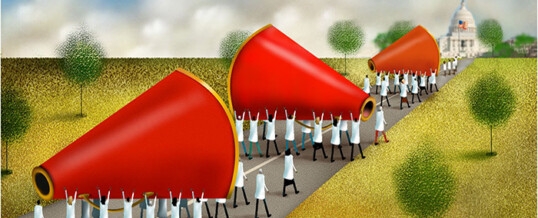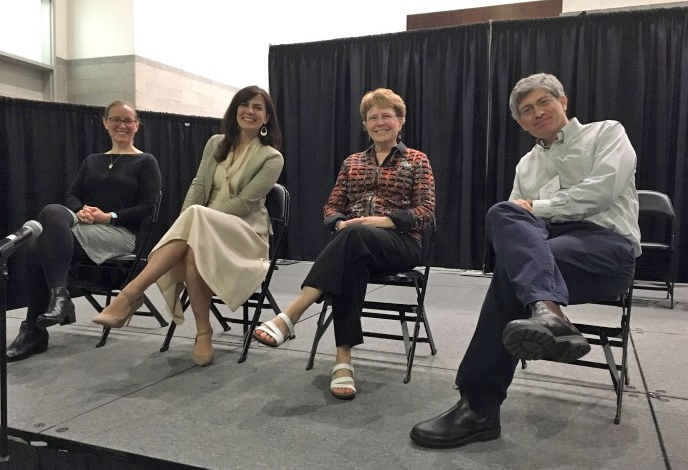Evolution2019 Dispatches: Navigating relationships between science and the public
July 5, 2019

FROM THE SOCIETY FOR THE STUDY OF EVOLUTION BLOG
BY KERRY GENDREAU | JULY 5, 2019
“To be maximally helpful in society, scientists in academia need to take collective action to engage effectively.”
– Jane Lubchenco
How do we bridge the gap between scientific and public knowledge and address the resulting disconnect between data and public policy? The American Society of Naturalists’ Vice Presidential Symposium at this year’s Evolution meeting, entitled “Politics, the public, and science: navigating the new reality,” addressed this topic as a call to action. Organized by professor and science writer Doug Emlen, this symposium brought together four science communicators from different fields: journalist and science writer Carl Zimmer, professor and author of the science blog Dynamic Ecology Meghan Duffy, executive director of The Story Collider podcast Liz Neeley, and ecologist and political advisor Jane Lubchenco.

Carl Zimmer started the discussion by addressing the mounting crisis in journalism of fabricated news and “alternative facts,” touching on the common theme uniting all of the talks: how do we get people to recognize credible news sources and to understand the information that they provide? He referenced the website Natural News, which uses its platform to propagate anti-vaccination and anti-science sentiments to advertise “natural” and holistic health products, noting that Natural News had more followers than the New York Times before being banned from Facebook for providing misleading and inaccurate information. He pointed out that foreign intelligence agencies promote such websites to exacerbate the polarization of news sources and create discord among US citizens.
This bombardment with discordant information has resulted in widespread mistrust of scientific evidence, which is reflected in recently proposed bills like the Honest Act (H.R. 1430), which may limit the use of scientific data for environmental policy decisions. Environmental policy depends on environmental science, and it should be obvious that scientific expertise is critical to making rational and sustainable environmental policy decisions, yet this bill was passed in the House in 2017 without amendment before being stalled in the Senate.
As a solution to such issues, Zimmer emphasized the need for education reform, suggesting that public schools provide courses in digital literacy (the ability to assess the credibility of information found on the internet) and basic statistics.
Picking up on the idea of scientific literacy, Meghan Duffy discussed her experiences trying to incorporate lessons on climate change in her undergraduate biology classroom. She showed some striking results from surveys of undergraduate students suggesting that, while most students acknowledge that climate change is a real threat, they do not necessarily understand what it is or what is driving it. She stressed the importance of teaching climate literacy to undergraduate biology students by equipping them not only with facts, but with the capability to make informed decisions about climate-related policy. I realized that, coming from a background in molecular biology and biotechnology, I was never asked to read a science-related bill or to know a politician’s stance on environmental issues during my undergraduate studies. This was during a time at which major climate legislation was being proposed. Had we discussed the costs and benefits of this proposed legislation in school and had someone imparted to me the power of my voice in government, I would have taken an active role in advocacy ten years ago when we were still talking about climate change mitigation rather than adaptation.
Jane Lubchenco and Liz Neeley focused on effective communication, giving advice on how to engage the public by keeping our messages simple and accessible. Neeley also discussed the importance of properly framing conversations about science and the public. A popular narrative among scientists has been the idea that policymakers are engaged in a “war on science”; however, this framework, said Neeley, may be detrimental to the public opinion of the scientific community. The panelists collectively encouraged incorporating a human element into our discussions about science, by building relationships with our audiences, actively listening, incorporating warmth into our conversations, and acknowledging the uncertainty and messiness that is inevitably a part of all science, rather than just providing facts and arguments.
Lubchenco pointed out that scientists have a tendency to dictate rather than to inform, highlighting this as one of the underlying causes of the current disconnect between scientists and the community. She went on to illustrate the effectiveness of a two-way scientific conversation when she recalled her experience briefing then-Vice President Joe Biden on the potential effects of a major oil spill in the Gulf of Mexico. Biden was amazed at her straightforward explanations, which he didn’t expect from a scientist.
Lubchenco ended her talk by stressing the urgency of taking action to increase scientific literacy and to bridge the gap between science and the public. Scientific advancement need not be limited to scientists but should be co-created by listening to and addressing public needs and fostering two-way conversations. We need to promote public understanding of the use and interpretation of data rather than suppressing it. If we want to use scientific knowledge to make a difference,academics need to recognize their responsibility to teach the citizens of tomorrow and we, as scientists, need to actively and honestly share our stories and opinions with the public and with our elected representatives.




